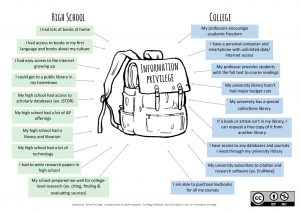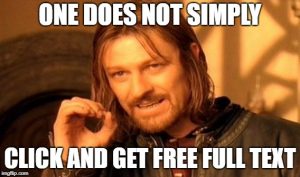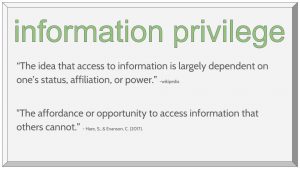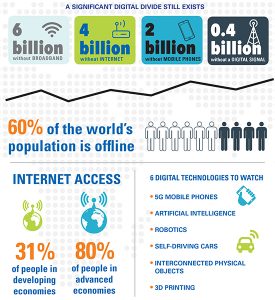Topic
|
Information Privilege
|
| Key Takeaways |
- Lots of scholarly information is inaccessible to people outside of large, well-funded research universities like Duke.
- There are barriers to information access that people might encounter due to their geography, access to technology, identity, status, financial situation, etc.
- The Open Access movement seeks to address these disparities.
|
|
Notes for the instructor/librarian
|
This topic could potentially be a touchy subject for students who haven’t thought about these aspects of privilege previously and should be framed carefully. It could be a great fit for an undergraduate course that has any social justice component. Students in these classes might be better primed for talking about disparities/inequalities and could apply that to this concept of information access. However, this discussion can be applicable to any level/discipline.
|
| Lesson Content |
Below you will find a variety of ways to briefly address this topic. Pick, choose, and adapt as you like. |
| Quick Mentions |
- When teaching a class and discussing databases, talk to students about how they will lose access to most of our databases upon graduation.
- Mention alternative sources of free and open access information: public libraries, Google Scholar, unpaywall.org, Open Access Button, etc.
- Mention to students that they will likely rarely encounter an item (book, article) they can’t get through Duke Libraries, but many students at smaller colleges or researchers outside of the United States and western Europe may face significant barriers to getting the academic material they need.
|
| Discussion Questions |
- Who has access to scholarly information and who does not?
- Should access to scholarly information be free (why or why not)?
- Should access to information be a human right? (Give an example: study reporting experimental cancer treatments; access to legal information for someone who is incarcerated). If not, are there certain types of information that you think should be free vs. others that should have a fee?
- What barriers to information access can you think of?
- “Access to science is going to be a first-world privilege … that’s the opposite of what science is supposed to be about.” — Guy Geltner, Professor of History, University of Amsterdam
|
| Visuals & Media
(See all content in Google Drive) |
- Invisible Knapsack / Information Privilege graphic –

The “invisible knapsack” was introduced by Peggy McIntosh in a 1989 essay she wrote on “white privilege.” The essay describes what privilege (in this case, white privilege) looks like in everyday situations. This image riffs off of this and presents examples of what information privilege might look like. The image could spark a conversation for students about the privileges around info access they have experienced, but had not thought about.

- Defining Information Privilege

- Digital Divide – who has access to the internet & who does not. This infographic from the IMF illustrates some of the issues surrounding the global digital divide.

|
| Activities
(See all content in Google Drive) |
- Game / Quiz / Survey
- Should these be free … (Why, or why not??)
- Slide provides some examples of source types (popular movie, book, journal, engineering standard, market research report) to serve as a discussion about what kind of information is free/not free. Could adapt to examples from the topic/discipline of the course.
- Case Studies / Scenarios (similar scenario-based lesson plan from Project CORA). Notes for instructor: Provide background on results of lack-of-access in these scenarios – in journalism, in community colleges, in politics.
-
- Example: A student at a community college is taking a Biology class and researching zebrafish. The student finds an interesting article in his Google search results, but hits a page asking for money (a.k.a. a paywall). Instead of paying $45(!) for the article, the student finds some alternative information on the topic in a Wikipedia article.
- Example: A journalist for a local independent newspaper is doing some investigative research on the growing trend of “white flight” between students attending public schools and charter schools in the community. The journalist finds some interesting articles in scholarly education journals and books listed on Google, but her newspaper does not have subscription access. What should she do?
- Example: You are graduated and interning on Capitol Hill. Your boss asks you to find the latest information on water safety and public health. You’re able to find some readily available sources, but most of the evidence-based/scientific water studies are behind a paywall. What do you do?
- Information Privilege Walk: An activity where the facilitator (instructor or librarian) asks students to stand up and line up on one side of the room. The facilitator reads a list of questions related to information privilege. Students take a step forward if they answer yes, and step backward if the answer is no. Note for instructor: This activity would be best done when facilitator has a rapport with the students, as it may make some students uncomfortable. It could be adapted to be an used as an anonymous questionnaire, or a list of questions for discussion, if anonymity makes more sense. See Google Drive folder for sample Information Privilege questions.
|
| Student Readings |
|




